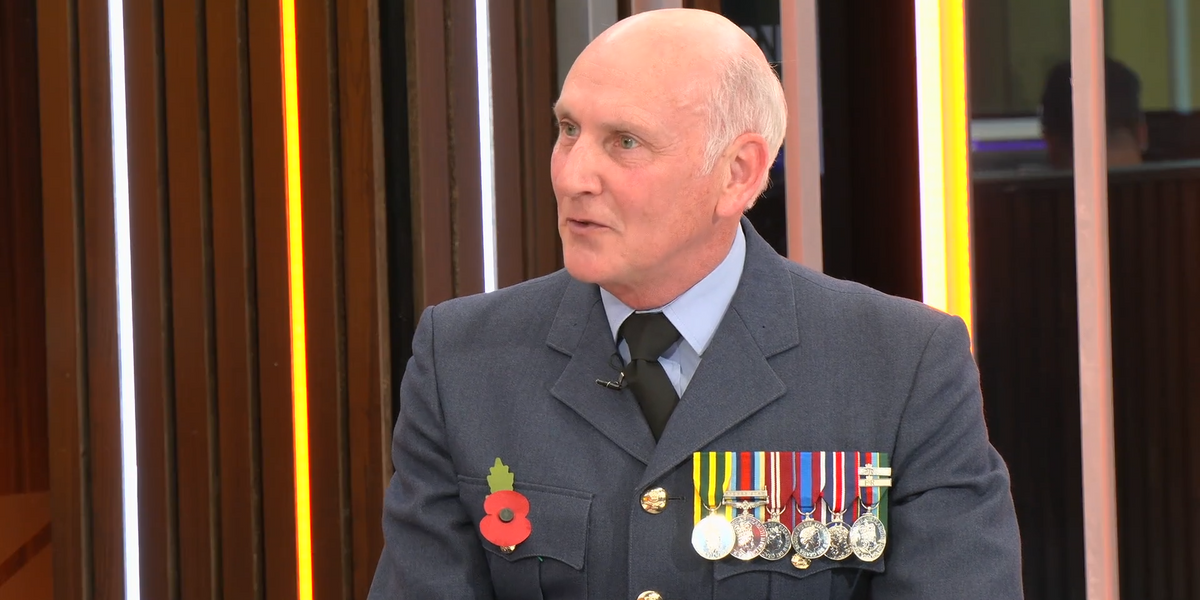Wing Commander Howard Leader QVRM has called for “more support” for those veterans who are “still suffering” as a result of life-changing injuries, as the nation marks Remembrance Sunday.
Thousands of military veterans will gather at The Cenotaph in London to remember the fallen, and those who have sacrificed so much for Britain.
Speaking to GB News, RAF Wing Commander Howard Leader QVRM highlighted the importance of paying tribute not only to those who lost their lives in service to our country, but to support those who are living and “suffering”, either physically or mentally.
Leader explained: “To anybody that has served for this country or indeed our Commonwealth allies and our friendly countries, paying our tributes to the fallen first and foremost is most important.
RAF Wing Commander Howard Leader QVRM has called for more support for injured veterans
GB News
“They have laid down their lives in usually terribly traumatic circumstances, because our governments have asked them to go and do that very difficult work, so that’s vitally important.
“But I think there’s a much there’s a much deeper set of considerations that I’ll be thinking about every Remembrance. And that’s remembering also that a great many people have been put into those very challenging circumstances, forever carry the sometimes extreme physical injuries that have come with that, because they’ve been involved in an incident that has cost them arms and legs.”
Noting the impact on a veteran’s mental health as well as physical, Leader stressed that the mental suffering “stays with them”, and those serving are “exposed to things humans are not conditioned to deal with”.
He added: “The mental stress stays with a lot of people too, because in some cases they’re exposed to things that humans are not really conditioned to see and to experience.
Military veterans will gather at The Cenotaph to remember the fallen
PA
“And I think we need to remember that and, and be mindful that we have a community of veterans who may need more support than they’re getting.”
LATEST DEVELOPMENTS:
In agreement with Leader, host Anne Diamond expressed her concerns for the “lack of acknowledgement and support” for injured and living veterans, asking why the support isn’t there for them.
Anne told GB News: “Today will be a wonderful spectacle. Watching all those people march past The Cenotaph, every one of them with a story, but they are alive.
“It’s one thing to remember the dead, but to remember those who’ve had life altering changes because of conflict, those are the ones that we just don’t seem to be able to acknowledge fully and help. Why can’t we motivate the same sort of level of emotion towards them?”
Leader responded: “When there are obvious physical injuries, it’s easier for people to realise that that person has suffered and to offer some sort of support. I think it’s particularly difficult when it’s the non-obvious effects of of their services.
Leader told GB News that the Armed Forces Covenant is a ‘great idea’
GB News
“Of course, this doesn’t apply to everybody. A lot of people go through their service careers and they come out of it as strong individuals and look back on a very interesting time. But there of course are many who, because of circumstance, those peculiar moments in active service, find themselves in a position where they’ve experienced something very traumatic.”
When asked by host Stephen Dixon if there needs to be more support for the military covenant, Leader admitted that it isn’t “well known enough” by veterans who may need it.
Leader concluded: “I think the Armed Forces covenant is a great idea, and I don’t know that it’s well enough known yet. It’s only been going for about a decade, and I’m a reservist, so I’m in the RAF Reserve and Royal Auxiliary Air Force and have spent all of my time as a specialist contributor. So I’ve had a civilian career alongside that.
“But the armed Forces covenant is particularly important to reservists because it puts a measure of protection around individuals who will, by the state, be required to take some time out of their day job and go and serve our country.
“And it guarantees that they’ll have their job to go back to at the end of that service. And what we found in the reserve area is that employers have been, on the whole, very eager to to get involved with that and sign up for it, because the training and the skills and the leadership that individuals learn during their military service, translate translates directly to what they do in their in their day jobs, so there is a symbiosis there.”

